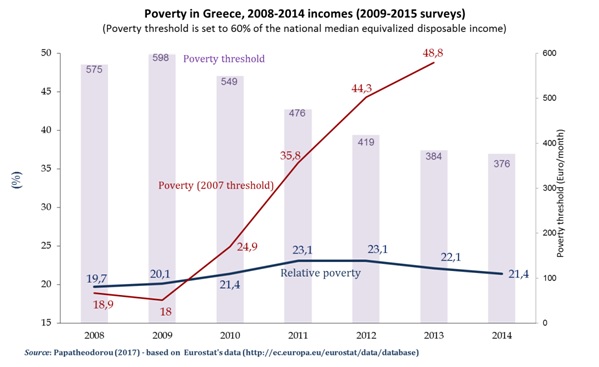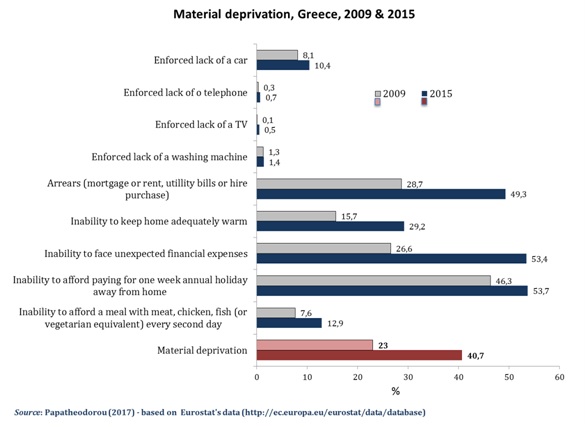Christos Papatheodorou is Professor of Social Policy, Panteion University of Social and Political Sciences, Athens. He holds a PhD from the London School of Economics and Political Science (LSE). He has been Dean of the School of Social, Political and Economic Sciences, and Professor of Social Policy at the Department of Social Administration and Political Science, Democritus University of Thrace. He is a founding member of the Hellenic Social Policy Association and has been head of the Research Unit “Social Policy, Poverty and Inequalities”, Labor Institute, Greek General Confederation of Labour (2010-2016).
Professor Papatheodorou research interests are in the fields of political economy of social policy, economic inequality, poverty, macroeconomic environment and social protection, functional and personal distribution of income. His publications include “Child Poverty, Youth(Un)Employment and Social Inclusion” (2016) “Dismantling the feeble social protection system of Greece: Crisis and austerity measures consequences” (2016), “Economic crisis, poverty and deprivation in Greece. The impact of neoliberal remedies” (2015), “Inequality, poverty and economic crisis in Greece and the EU” (2013)“The contribution of social protection system in economic growth” (2012), Structure and trends in economic inequality and poverty in Greece and EU, 1995-2008” (2010) and “Poverty and Social Deprivation in the Mediterranean Area: Trends, policies and welfare prospects in the new millennium” (2006).
Christos Papatheodorou spoke with Rethinking Greece* about the “moral hazard” hypothesis that accompanies public discourse on the Greek crisis and how it legitimizes austerity measures that have immense impact on poverty and standard of living. He stresses that according to data Greeks work more hours and at the same time have one of the highest poverty rates in Europe. He also discusses determining factors of inequality and poverty levels in Europe underlying the role of its varying social protection systems and pointing out that social expenditure should be perceived as a contributor not to economic crisis but to its solution.
Papatheodorou refers to a shift of the social policy in Greece toward alleviation of “extreme poverty” (instead of promoting total social welfare) which is caused by the introduction of Guaranteed Minimum Income schemes inspired by neoliberal thought and practices. He concludes that these policies lead to a systematic shift of the Greek social protection system towards a liberal one (as opposed to social-democratic and corporatist models) that has “proved less efficient in utilizing and administrating social resources for alleviating poverty and inequality and for promoting peoples’ well-being.”:
“Greeks are lazy” has been a common stereotype in the mainstream media – especially in Germany, associated with a general view of Greece as an exception from the European canon. Would you like to comment on this?
We have to bear in mind that in order to strengthen neoliberal perspectives in administrating modern economies and societies, the current economic crisis was presented by dominant rhetoric not as a global issue but rather as a problem of individual countries reflecting their own imbalances and weaknesses. Thus, public discourse at a national and international level presented the Greek crisis as an isolated incident, not connected with the global economic crisis. Greeks were portrayed as responsible for this crisis, and as having had enjoyed high consumption and standard of livings well beyond their meansduring the pre-crisis period. Within this rhetoric, Greeks were also accused for being lazy, for working less hard than other Europeans, and for being supported by a generous social protection system. Furthermore, under the mainstream hypothesis of “moral hazard”, Greeks had to be penalised in order not to repeat the same mistakes. With the large support of the media and despite the lack of any empirical plausibility, these views were widely reproduced and dominated public debate and official rhetoric in Greece and abroad, contributing in legitimising austerity measures that have been implemented as the remedy to reduce the huge public debt, and to cure economic crisis.
The myth that Greeks are lazy is easy to be busted by referring to Eurostat’s official data that provide a totally different picture. The average hours that Greeks work per week in their main jobs are significantly higher than the corresponding average figure for the EU-15 and EU-27 countries. Thus in 2008 and 2015, that is before and after the impact of economic crisis to Greek economy, Greeks worked on average more than 42 hours weekly in their main jobs. This is significantly higher than the corresponding figure of any other EU countryas well as the average figures for the total EU, which is 37 hours. Compared to the other Europeans, Greeks work more hours and have one of the highest poverty rates in Europe.
What is the social impact of the economic crisis and its subsequent austerity measures in Greece? Can you refer to some data on poverty and the level of living in the country?
To answer this question it is crucial to paint the picture of the country before and after the effect of economic crisis and of the implementation of the austerity measures. As I mentioned before, one of the most popular myths that is largely reproduced by media, politicians and policy makers at national and international level is that Greeks before the onset of the crisis had enjoyed a high standard of living. Even recently, Poul Thomsen, the Director of the IMF’s European Department, mentioned that the Greeks are as wealthy as the Germans. According to the Eurostat’s official evidence and the broadly used poverty threshold of the 60% of average equivalent disposable national income, since the mid-1990s (where comparable estimates for EU countries are available), poverty rates in Greece were at 20%-22%, well above the corresponding figures for total EU-15 and EU-28 that were at 16%-17%. Even more, for the period before the onset of the economic crisis (1995-2009), Greece had on average the highest relative poverty risk among all the EU-15 countries. However, these estimates are based on poverty lines defined at a national level and therefore are not proper in picturing the true differences in living standard between EU countries.
As we have shown in other studies, when the comparison is based on a common to all EU countries poverty line, the real differences in living standards between Greece and the rest of Europe become clearer. Thus, comparable estimates of poverty rates in the EU, based on the Danish poverty line and taking into account differences in purchasing power, shows that in 2009, before the onset of the economic crisis, 39% of the Greeks had similar low level of livings to those of the poorest 17% of German, 13% of Danish or 10% of Dutch. Therefore, even before the economic crisis affected Greek economy, there were huge differences in poverty levels and in standard of livings between Greece and most of the other EU-15 countries.
The economic crisis and the austerity measures that were implemented since 2010 have a devastating effect on poverty and the level of livings of the Greek population. The most recent available data for people’s incomes are those of the 2015 surveys that refer to 2014 incomes. The Eurostat’s data shows that relative poverty rates increased from 20% in 2009 to 23.1% in 2012. However, this poverty index is not the most appropriate one for capturing the worsening of the level of livings during this period, as it is calculated as a percentage of national median income and thus it is affected by changes in the incomes of those in the middle of the distribution. Indeed, between 2009 and 2014, median income and consequently poverty line in Greece has reduced by 37%. This is also indicative of the effect of crisis and of austerity measures on people’s incomes and particularly on middle income groups. More revealing are the estimates based on a poverty threshold anchored at a fixed moment in time. These are estimates of poverty risk using the same poverty threshold of a particular base year, adjusted for inflation and differences in purchasing power. Estimates of poverty risk based on the 60% of the median equivalised disposable income of 2007 (2008 survey) shows that poverty rate increased from 18% in 2009 to 49% in 2013. In other words, half of the Greek population in 2013 had similar low standard of livings as the 18% of the poorest population in 2009. This indicates the devastating effect of the crisis and of the austerity measures on people’s poverty in only 4 years.
 It is also worth mentioning that in just one year (2010-2011) the proportion of the population that were living below the 2007’s poverty threshold increased by 11 percentage units. This is the year when the austerity policies were introduced following the three party memorandum agreement signed by the Greek Government and the Troika (EC, ECB and IMF). Since the introduction of austerity measures, dramatic was also the increase in material deprivation. This is an alternative to income poverty index that measures people’s inability to afford a number of items and expenses, necessary for maintaining a certain level of livings. People are considered materially deprived if they cannot afford three or more of nine items and expenses. Those materially deprived in Greece rose to 41% of the total population in 2015 from 23% in 2009. More than half of the population cannot afford a week’s holiday and have difficulties in facing unexpected financial expenses. One out of two people are unable to pay mortgages, rent payments, utility bills and so on. Also one out of three people are unable to keep their home adequately warm.
It is also worth mentioning that in just one year (2010-2011) the proportion of the population that were living below the 2007’s poverty threshold increased by 11 percentage units. This is the year when the austerity policies were introduced following the three party memorandum agreement signed by the Greek Government and the Troika (EC, ECB and IMF). Since the introduction of austerity measures, dramatic was also the increase in material deprivation. This is an alternative to income poverty index that measures people’s inability to afford a number of items and expenses, necessary for maintaining a certain level of livings. People are considered materially deprived if they cannot afford three or more of nine items and expenses. Those materially deprived in Greece rose to 41% of the total population in 2015 from 23% in 2009. More than half of the population cannot afford a week’s holiday and have difficulties in facing unexpected financial expenses. One out of two people are unable to pay mortgages, rent payments, utility bills and so on. Also one out of three people are unable to keep their home adequately warm.
 What are the main traits and determining factors of inequality and poverty levels in Europe and Greece? What are the effects of social protection systems? Do classical typologies of welfare state regimes (e.g. Esping-Andersen‘s classification) also explain the differences in income inequality?
What are the main traits and determining factors of inequality and poverty levels in Europe and Greece? What are the effects of social protection systems? Do classical typologies of welfare state regimes (e.g. Esping-Andersen‘s classification) also explain the differences in income inequality?
A comparative analysis between EU countries reveals that the social protection system and the relevant expenditures are key variables in explaining the differences in inequality and poverty among countries. We will focus on the oldest EU-15 member states where we have comparable data since the mid-1990’s and there is a well-developed academic debate concerning their social protection system. Following the Esping-Andersen’s typology of the three welfare regimes and the subsequent debate on the welfare system that is developed in the southern EU countries, we will find out that the highest in equality and poverty are in the countries of South Europe (Greece, Portugal, Italy and Spain) and the countries that have developed a liberal social protection system (UK and Ireland). By contrast, the lowest inequality and poverty are found in countries with a social-democratic welfare system (Scandinavian countries) followed by the countries of the corporatist-conservative welfare regime (mainly continental European countries such as Germany and France). These differences in inequality and poverty alleviation between welfare systems still hold even if we adjust for the differences in total social expenditures.
Overall the evidence suggests that social protection systems that are characterized by generous and universal welfare provisions, such as those of the Scandinavian countries, are more efficient in utilising the available social resources for alleviating poverty and inequality and for promoting peoples’ welfare. Less capable of using the social resources effectively for promoting equality are the Southern EU countries with fragmented social transfers and those with a liberal social protection system that is based on means tested benefits and with a prominent role of the market in the distribution of resources.
 The Greek social protection system shares common traits with the other southern EU countries. It is less developed, deeply fragmented with rudimentary welfare policies, highly polarized and with huge gaps in social provisions. These gaps are partly filled by families and kin that are playing a significant role in social care. The Greek system is particularly weak in poverty and inequality alleviation. Social transfers in cash (except pensions) have by far the weakest distributional impact among all EU-15 countries. The need for reforms in the Greek social protection system is largely acknowledged in academic and public debate. However, the memorandum agreements have put pressure for transforming the Greek social protection system to a liberal one, although the evidence have shown that it is the least efficient one, compared to other systems, as far as the use of available resources in alleviation poverty and promoting peoples’ welfare in concerned. The social protection system acts as a catalyst in the effectiveness of social spending and in the distributive role of economic growth. Improving the social protection system, through more generous benefits and universal coverage, is crucial to alleviate the impact of economic crisis on poverty and deprivation
The Greek social protection system shares common traits with the other southern EU countries. It is less developed, deeply fragmented with rudimentary welfare policies, highly polarized and with huge gaps in social provisions. These gaps are partly filled by families and kin that are playing a significant role in social care. The Greek system is particularly weak in poverty and inequality alleviation. Social transfers in cash (except pensions) have by far the weakest distributional impact among all EU-15 countries. The need for reforms in the Greek social protection system is largely acknowledged in academic and public debate. However, the memorandum agreements have put pressure for transforming the Greek social protection system to a liberal one, although the evidence have shown that it is the least efficient one, compared to other systems, as far as the use of available resources in alleviation poverty and promoting peoples’ welfare in concerned. The social protection system acts as a catalyst in the effectiveness of social spending and in the distributive role of economic growth. Improving the social protection system, through more generous benefits and universal coverage, is crucial to alleviate the impact of economic crisis on poverty and deprivation
According to some analysts Greek welfare state reflects a complex constellation of interest groups and doesn’t provide real support for the poor and the unemployed. Is it fair to blame public spending on welfare state provisions of this kind for the current economic crisis?
Indeed, the Greek social protection system faces serious drawbacks and imbalances, and it definitely needs reform and improvement in order to become more efficient in fulfilling certain distributional and equity goals. As mentioned above, dominant rhetoric at national and international level have demonised social protection and the corresponding spending as major contributors to the huge public depth and thus to economic crisis. Social protection was blamed of being particularly generous, relative to the country’s economic growth, promoting the high standard of livings that the Greeks had supposedly enjoyed. These views helped legitimise cuts in social expenditures as a crucial component of austerity policies and thus further undermined the country’s already weak social protection system. These cuts has profound implications to people’s level of livings and to social cohesion. The generosity of the social protection system and the high social expenditures is another myth which was systematically cultivated by dominant rhetoric during this period. According to Eurostat’s data, since the early 1990s Greek social expenditures as percentage of GDP have been well below the average figures for total EU. Recent data show that even during the economic crisis, when there is a huge demand for social protection due to the severe social consequences of the crisis (such as the enormous increase of unemployment and poverty) social expenditures as percentage of GDP have remained lower that the average figure of total EU. This is despite the fact that the country’s GDP reduced by almost 25% in that period. Also social expenditures per inhabitant in pps (i.e taking into consideration differences in purchasing power) have been significantly lower in Greece than the average figure for total EU. Even more, since 2009 (during the crisis) social expenditures per inhabitant have further reduced considerably in Greece while the corresponding figures for average EU-15 and EU-28 have increased.
It is apparent that Greece does not spend much on social protection compared to other EU countries. What is more striking is that social protection expenditure has been perceived as a contributor to economic crisis and not as a part of the solution, as the experience of the 1929’s crisis showed. The dominant neoliberal paradigm does not consider social policy as an organic part of macroeconomic policy that could play a prominent role in economic growth due to the high values of their fiscal multipliers. Studies have shown that the fiscal multipliers of social transfers are considerably high in Greece, particular for transfers in kind. This is something that was also admitted by IMF, which acknowledged that the initial design of austerity programs was based on wrong estimates of fiscal multipliers. Consequently cuts in social expenditures have negative effects on the country’s public depth viability. An increase in social expenditures, particularly those concerning transfers in kind, could contribute significantly to the increase of the country’s rate of growth.
Trade unions and left-wing critics see “Guaranteed Minimum Income” policies pushed by creditors as a threat that might constitute a “race to the bottom”. Now the government is launching a “Social Solidarity Income” programme addressing about 700.000 people. Can SSI be a helpful tool for poverty reduction in the country?
Social Solidarity Income is a Guaranteed Minimum Income scheme that goes back to the main neoliberal idea of negative income tax described by Milton Friedman and supported by other neoliberal prominent theorists such as Friedrich Hayek. This measure has been imposed on Greece by memorandum agreements. As a policy measure it focuses on a subsistence minimum through means tested cash transfers. Means tested policies are generally characterised by a high administrative cost and bureaucracy that lead to stigmatization of the recipients and to a low take-up. Furthermore they weaken other social provisions, particularly those in kind, leading households to seek a large number of goods and services previously provided by the social protection system in the market. The introduction of a guaranteed minimum income schemes is usually accompanied by cuts in other social provisions. This is move evident particularly when total social expenditures are not increased or are even decreased as it is the case in Greece.
What is more worrying is that the introduction of these policies leads to a shift of social policy’s focus toward alleviation of poverty instead of promoting total social welfare. These policies characterise the residual welfare systems. The main question is whether social policy should address only poverty or total people’s well-being. Social Solidarity Income is not even meant to help those in poverty but those in the subgroup of “extreme poverty”. By introducing this new concept of “extreme poverty”, poverty itself sounds as a non-extreme situation that should be addressed. Even the introduction of “extreme poverty” in the policy agenda is quite indicative of the transformation in the social protection system that the guaranteed minimum income schemes are causing. Overall these policies lead to a systematic shift of the Greek social protection system towards a liberal one, where social protection targets almost exclusively those in severe deprivation through means tested policies. As mentioned above, these policies have proved less efficient in utilizing and administrating social resources for alleviating poverty and inequality and for promoting peoples’ well-being.
*Interview by Nikolas Nenedakis















